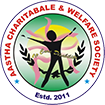Physiotherapists have been trained in the use of exercise therapy to strengthen your muscles and improve your function. Physiotherapy exercises have been scientifically proven to be one of the most effective ways that you can solve or prevent pain and injury.
Physiotherapy department is the integral part of Early Intervention program for specially disabled children guided by the experts from The National Trust under Ministry of social justice & Empowerment, Govt. of India.
The Physiotherapy Department prides itself on working as part of the multi-disciplinary team.
Physiotherapy is a holistic approach to the prevention, assessment, and therapeutic management of disorders of movement or optimization of function by the use of physical interventions, and/or electro physical agents, and/or exercise prescription within a framework of empowerment of the individual/care of the community through education.

Physiotherapists help people affected by injury, illness or disability through movement and exercise, manual therapy, education and advice. They maintain health for people of all ages, helping patients to manage pain and prevent disease
- Muscle strength evaluation and quantification.
- Physiotherapy exercises to maintain and increase joint range of motion.
- Evaluate and train sitting and standing balance.
- Physical therapy exercises to increase strength, endurance and coordination for other specific muscle groups or the entire body.
- Use various physical therapy modalities such as both superficial and deep heat and cold , electrical stimulation, traction and Electrotherapy for pain relief.
- Assess the patient’s wheelchair needs, including maintenance and assist with individualized wheelchair prescriptions.
- Progressive gait training with or without ambulatory aids.
- Exercises to reduce spasticity
- Prevention of Complications
Respiratory treatment, mobilization and activity, with the objective of minimizing complications resulting from the operation, anesthesia or immobility. Additionally, the treatment contributes to the prevention of deterioration and/or exacerbation of the pre-hospitalization medical condition.
- Promotion of Function and Mobility
Activation, strengthening and mobilization of the patient in order to enable resumption of maximal function and independence, using accessories if needed.
- Functional Assessment
Carrying out a functional assessment to recommend an appropriate framework for further treatment and promote the continuum of care, including rehabilitation.

- Rehabilitation
In Rehabilitation, we focus on improving the patient’s functional status, with an emphasis on restoring functional independence to the extent that is possible. Towards the completion of the period of rehabilitative hospitalization, the functional assessment is repeated in order to recommend an appropriate framework for further treatment and promote the continuum of care, in the community or in a care facility.
- Geriatric Condition
In geriatric conditions we focus on maintaining and improving the elderly patient’s functional status, with an emphasis on maintaining functional independence to the extent that is possible.
- After Long-Term Hospitalization
After long-term hospitalization, physiotherapy work focusses on maintaining the patient’s functional status, with an emphasis on maintaining functional independence to the extent that is possible. The physiotherapy treatment is performed as part of the multi-disciplinary treatment, among others department.
Paediatric Condition
The Physiotherapist applies physiotherapy skills and knowledge to the assessment of the child and the design, delivery and evaluation of a treatment programme for the management of neonates, infants, children and adolescents with disabilities. Our aims to maximize the child’s physical potential within the framework of Family Cantered Care using developmentally appropriate intervention.
We Evaluate a child’s ability in relation to his/her gross motor development and produce an assessment, advising parents and medical staff on the child’s needs. Specific assessments are often requested by education as part of a child’s “Assessment of special educational needs”, or by social services “Children’s with disability team” identifying a child’s present needs in order to find suitable careers or future needs to plan housing needs or alterations.
Advice parents, care-givers and the child, if old enough, on the condition and informing them on various physiotherapy options working in partnership with them on the most appropriate strategies to enable each child to achieve his/her potential.
We work closely with the child’s care- givers teaching through demonstration handling techniques to encourage the child’s gross motor development or specific techniques to maintain the child’s health
Faculty
Dr Uma Shankar Sinha (HOD) MPT, PhD, PGDHHM(Symbiosis)COMT(Australia)
Dr Shalini Sinha MPT in Neurology, PGDMLS(Symbiosis)
Dr Azmat Sohail BPT Certified Mannual Therapist
Dr Vidisha BPT certified Early Interventionist
Dr Afrin BPT, PG DIP in Early Intervention

